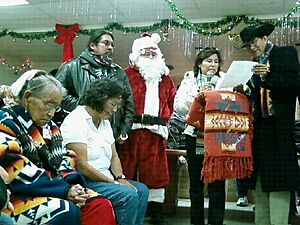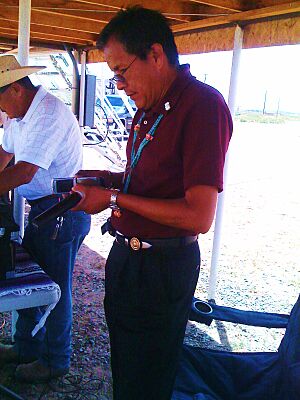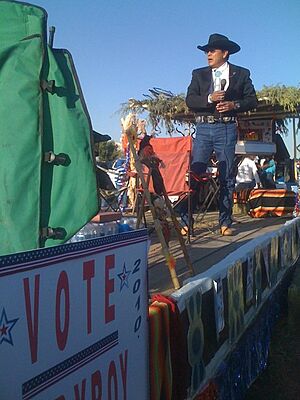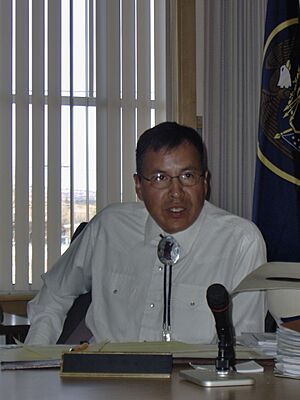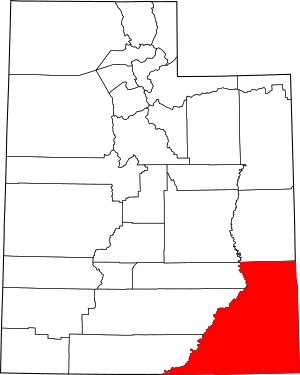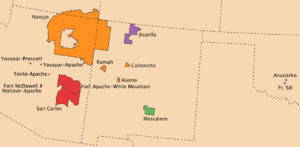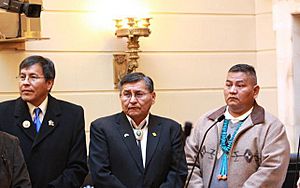Kenneth Maryboy facts for kids
Quick facts for kids
Kenneth Maryboy
|
|
|---|---|
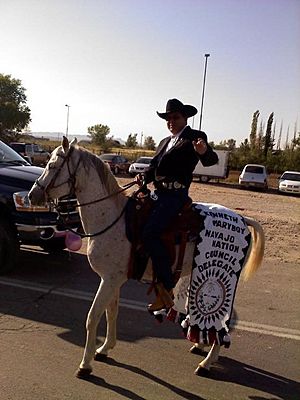 |
|
| Navajo Nation Council Delegate | |
| In office January 22, 2001 – January 10, 2011 |
|
| President | Joe Shirley Jr. |
| Preceded by | David L. John |
| Commissioner Dist. 3 of San Juan County | |
| In office January 2, 2007 – January 1, 2011 |
|
| Preceded by | Manuel Morgan |
| Personal details | |
| Born | May 13, 1961 |
| Nationality | |
| Political party | Democratic |
| Spouse | Cherly J. Maryboy |
| Residence | White Rock, Utah |
| Occupation | Radio (Sports, Basketball) |
Kenneth Maryboy (born May 13, 1961) is an American politician from San Juan County, Utah. He served as a Navajo Nation Council Delegate. He was also a San Juan County Commissioner. Kenneth Maryboy was the third Democrat in a row to be elected to the Commissioner District 3 position. This district was created in 1984. Rebecca M. Benally replaced him on the commission in 2015.
Kenneth Maryboy is the brother of Mark Maryboy. Mark served on the Navajo Nation Council for 16 years. He was also a San Juan County Commissioner for four terms. Kenneth and Davis Filfred both represented the Utah section of the Navajo Nation on the council. Kenneth also works with Rebecca M. Benally and the San Juan School Board. They focus on the school curriculum for Navajo students in Utah. He also works with Bruce Adams on San Juan County matters.
In 2010, Maryboy was reelected as both San Juan County Commissioner District Three and as a Council Delegate. This was for the newly reduced 24-member Navajo Nation Tribal Council.
Contents
Kenneth Maryboy's Early Life
When Kenneth was 18, he lived with his mother and younger brother. They lived on the reservation near Bluff, Utah. They had very little money, and Kenneth worked as a welder. Even though times were tough, Kenneth became very skilled at welding. Later, he learned to be an electrician. He continued to learn new skills that were in demand.
As he grew older, Maryboy became known as a "Medicine Man." People in the Four-Corners Region of the United States would seek his help. He helped people with their physical, mental, and spiritual needs. Maryboy helps connect the old ways of the Navajo people with modern American life.
He also had a natural talent for announcing. During rodeo seasons, he was often asked to announce for many different events.
Radio Announcer for KTNN
In April 1993, KTNN 660 AM started broadcasting commentaries for the NBA team, the Phoenix Suns. KTNN is a Navajo Language AM radio station. It broadcasts from Window Rock, Arizona.
Kenneth Maryboy, who was a rodeo announcer, joined KTNN Sports Director L.A. Williams. They did the play-by-play for their first Suns game. This was the first time a Navajo broadcasting station worked with a major league basketball team.
Kenneth Maryboy had happy memories of Christmas at St. Christopher's Mission when he was a child. He used these memories to create the Navajo Santa program. This program helps his people with the spirit of Christmas all year long. He changed the idea of Santa Claus to fit the needs of Native Americans. Many Native Americans are among the poorest people in the U.S. The program gives gifts like food, clothing, blankets, and toys. It also provides medical care and other services. He brings hope to everyone helped by his joyful program.
"I would like to see that the understanding and the caring will continue on—that people will understand togetherness and what caring means to other people I still envision a lot more things that I might be able to do, not only in the Navajo Nation but maybe in a broader area as well where there is need."
Navajo Santa is a non-profit organization. It was created to bring food, blankets, warm clothing, toys, and other necessities to Navajos in need. These people live on the reservation in southeastern Utah. The program is run entirely by volunteers. Navajo Santa helps create a cultural exchange and support between Navajos and non-Navajos.
Kenneth is now a commissioner for San Juan County. His solo Christmas Eve visits have grown into an annual Navajo feast. This event provides gifts of clothing, tools, and toys for over 700 people. Kids who cannot attend the event because they are sick or lack transportation get a personal visit. Kenneth or one of his helpers delivers the gifts.
He says, "My grandfather taught me that you learn to be a man and a warrior by sharing and by keeping promises."
Caring Institute Award
On November 18, 2002, Kenneth Maryboy traveled to Washington, D.C. He went to receive the Caring Institute Award. This honor had been given to famous people like Mother Teresa, President Jimmy Carter and Rosalynn Carter, and Paul Newman. Other winners include former Senator Bob Dole and Reverend Billy Graham.
In 2000, Maryboy was elected to the legislative body of the Navajo Nation Government. He became a Navajo Nation Council Delegate for the Mexican Water, Aneth, and Red Mesa Chapters. These areas cross the borders of Arizona and Utah. They represent nearly 10,000 people.
After being elected, Kenneth joined the Navajo Economic Development committee. He served as the Vice Chair for the Navajo Nation Council.
On December 15, 2009, tribal members voted to reduce the Navajo Tribal Council. It went from 88 members down to 24. The Navajo Nation Supreme Court ordered this change to happen right away on May 28, 2010. This action meant that Councilman Maryboy ran against fellow Councilman, Davis Filfred. This happened during the November 2, 2010 General Elections.
Councilman Maryboy won against Councilman Filfred. He won for a new "Shiprock Agency" section on the Navajo Reservation.
San Juan County Commissioner Role
In November 2006, Kenneth Maryboy was elected as the San Juan County Commissioner for District 3. The commissioners handle county issues in Monticello, Utah. The San Juan County Commissioner seat is a three-person council. They oversee the needs and issues for San Juan County's residents.
Commissioner Maryboy won the nomination for Commissioner. This happened after a tough primary election against Andrew Tso of Montezuma Creek, Utah. This was during the 2010 San Juan County Primaries.
Commissioner Maryboy's Election
After successfully defeating Andrew Tso, Maryboy was reelected to his county office. He ran unopposed in the 2010 San Juan County General election.
Balancing Roles as an Elected Official
After being elected as both the San Juan County Commissioner and a Navajo Nation Council Delegate, some questions came up. People wondered if it was right for one person to hold both positions. Serving two government bodies was a big topic of discussion. Kenneth Maryboy was in this exact situation.
On October 16, 2007, the Navajo Nation Council voted. They allowed delegates to serve as both Councilmen and County Representatives. This meant Maryboy could keep his positions. He remained both the San Juan County Commissioner and a Navajo Nation Council Delegate. He represented the Aneth, Red Mesa, and Mexican Water Chapters.
Kenneth Maryboy has to balance his role as a Navajo leader with his duties as a San Juan County commissioner. He took office in January. His brother, Mark Maryboy, made history in 1986. He was the first American Indian county commissioner in Utah's history, also in San Juan. Since then, San Juan County has always had a Navajo county commissioner.
Bruce Adams, another San Juan Commissioner, said: "More than 55 percent of registered voters in San Juan County are Native Americans, and they need to be represented, which is something that maybe Anglo commissioners had not had that perspective before."
Historically, Navajos living in Utah were often overlooked. This happened not only by county and state governments but also by the Navajo Nation.
The narrow Utah strip is located in the Four-Corners region of the United States. It is home to 8,000 of the Navajo Nation's 300,000 citizens. San Juan County officials used to believe that Utah Navajos were mainly the tribe's responsibility. The Navajo Council, however, thought their Utah relatives could manage on their own. This was after a 1933 federal rule. It gave them 37.5 percent of the money from rich oil fields near Aneth, in Utah's part of the reservation.
Between 1933 and 1990, the Utah Navajo Oil Trust Fund lost $150 million. This was according to a Utah legislative auditor's report. The Navajos' lawsuit against the state is still ongoing. Utah is the only state that manages a trust fund for American Indians whose lands are within its borders. The Utah Navajos wanted a bigger role in how the money was given out. This would give them that chance. State leaders promised to make the transfer process as smooth as possible for the people who benefit.
The Utah's Navajo Trust Fund law was set to end in 2008. In 2007, Utah Governor Jon Huntsman and state legislative leaders worked together. They asked Congress to create a new way to distribute the money. Utah legislative leaders are now actively working with the Utah Navajo people. They are discussing how to control these funds.
Utah Senate Minority Leader Mike Dmitrich said: "Our congressional delegation must create a vehicle to distribute these monies in a way that all of the Chapter Houses have input."
Kenneth Maryboy and Davis Filfred have been active in the Utah Navajo Trust fund. They are also helping with the transfer of control. This means moving from Utah's main role in controlling the fund to the Utah Navajos themselves.
Kenneth believes his job is to help bring basic services to the people in his district. Many Navajo Nation services are not available on the Utah side of the reservation. For example, there are no Navajo Nation Health, Education, and Welfare offices in Utah.
Recently, Council Delegates Kenneth Maryboy, Davis Filfred, and former Council Delegate Mark Maryboy have been working hard. They want to make sure that the Aneth Oil Royalties stay with the Utah Navajo people.
However, this effort faces challenges. The Navajo Nation itself has been working to take over the Aneth Oil Revenues. This creates a big problem for Kenneth and his goals.
On June 16, 2008, Kenneth Maryboy, Mark Maryboy, Davis Filfred, and Phil Lyman traveled to Washington, D.C.. They presented a plan to Congress. This plan showed how to easily transfer the Utah Navajo royalty money from the State of Utah to a working Utah Navajo organization.
Also, on December 8, 2009, the U.S. Senate Indian Affairs Committee held two hearings. These hearings took place in Washington, D.C.
Senate Bill 1690
The first hearing was about Senate Bill 1690. This bill would transfer the responsibility and money for the Utah Navajo Trust Fund. It would move it from the state of Utah to the Utah Dineh Corporation Inc. The second hearing looked at the long delay in decisions about Indian land transactions at the Interior Department. This delay often stops tribes from using their lands for years.
Locally, a big issue is a strong disagreement over a trust fund. This fund holds money from oil and gas leases in and around Aneth. The fund's value doubled to over $52 million in 2025. This happened when Utah agreed to settle a lawsuit about past problems with the fund.
Utah gave up its role in overseeing the fund two years ago. No projects to help the Utah Navajos can start until Congress chooses a new group to manage the money. Many Utah Navajos do not have electricity or running water. The Navajo Nation, which gets 62.5 percent of the oil money, wants control of the entire fund.
Kenneth Maryboy, who was a council candidate and a San Juan County commissioner, strongly disagreed. He said, "Keep the money in Utah."
On January 27, 2009, a Navajo group attended Indian Caucus Day. Utah Navajo Delegates Maryboy and Davis Filfred went to the Utah State Capitol. They spoke up for Navajo people living in Utah.
Elected leaders from Utah's five tribes met with former Utah State Gov. Jon M. Huntsman Jr., Gov. Gary R. Herbert, Attorney General Mark Shurtleff, and many program directors. They stressed how important it was to keep enough money for programs. These programs provide direct services to tribal citizens.
The state of Utah announced big budget problems for the upcoming year. They suggested possible cuts of 15 percent for state agencies. At the meeting, tribal leaders urged Utah state leaders to understand the limited state services available to Utah tribes. They asked for specific programs to be kept, despite the state's economic challenges.
Kenneth Maryboy stated, "With proposed budgetary cuts, it is important as tribal leaders that we are clear about what state programs we believe are most important to retain. It is also pertinent we are clear about what our goals are in terms of strengthening state and tribal relations."
Kenneth Maryboy's Life Outside Politics
Even though politics takes up a lot of Kenneth's time, he has found hobbies to balance his busy public service life. He enjoys spending time with his family. They like riding ATVs and hunting. The Maryboy family is very involved in outdoor racing events. These include mudbogging and drag racing. In fact, the Maryboy family runs a racing club called Whiterock Racing.
Like many Western Democrats, Kenneth enjoys spending time outdoors. He takes advantage of the beautiful rural environment in the Southwest. He loves activities like hunting and fishing. The southern Utah area offers many outdoor activities for people who live there. Kenneth continues this tradition, just like most Utahns.
Many people in southern Utah enjoy what Lake Powell has to offer. Kenneth and his family enjoy the many opportunities the lake provides. Many other Utahns and Southwestern Americans also take advantage of these activities.
 | Sharif Bey |
 | Hale Woodruff |
 | Richmond Barthé |
 | Purvis Young |


